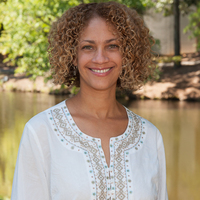Erica Dotson
Clayton State University, Teacher Education and French, Faculty Member
- Erica received her Ph.D. in French Linguistics and Educational Studies from Emory University. She is currently a Prof... moreErica received her Ph.D. in French Linguistics and Educational Studies from Emory University. She is currently a Professor of French Linguistics and Teacher Education at Clayton State University where she also coordinates the ESOL Endorsement Program and is the Director of the university's Maymester abroad in France Program. Erica's research focuses on the intersection of language and culture, as well as critical multicultural education and critical professional development for teacher educators.edit
Research Interests:
Research Interests:
This article explores the intersection of selves and policies for teacher educators in an era of teacher education reform. Borne out of a promise to one another to write about our experiences navigating increasingly complex market-driven,... more
This article explores the intersection of selves and policies for teacher educators in an era of teacher education reform. Borne out of a promise to one another to write about our experiences navigating increasingly complex market-driven, neoliberal attacks on our work and world, we collected data across several years that documented our attempt to break our silence (Lorde, 1977) and explore how we, as teacher educators, make sense of neoliberal reforms and policies in teacher preparation. We draw specifically on Dunn’s theory of the Hydra of Teacher Education (2016), alongside literature on reforms and policies in teacher preparation and teacher educators’ forms of resistance to frame our work, and utilize arts-based poetic inquiry methodology (Prendergast, 2009; Rath, 2001) to explore the real, everyday implications of educational policy in our lives and in our careers. The poems we created as a “performative act” (Prendergast, 2009, p. xxiii) revealed that our experiences seemed ...
Research Interests:
Stanford Center for Assessment, Learning, and Equity (SCALE) provided a commentary on the manuscripts in the first part of this special issue, which highlighted the benefits of edTPA and the necessity for such assessment programs to... more
Stanford Center for Assessment, Learning, and Equity (SCALE) provided a commentary on the manuscripts in the first part of this special issue, which highlighted the benefits of edTPA and the necessity for such assessment programs to improve teacher education and strengthen teaching practices. In turn, the authors responded to the SCALE commentary. The authors’ responses raise concerns about equity, fairness, and unintended consequences of teacher performance assessments. These responses highlight the need for continued dialogue on ways to improve teacher education and strengthen the teaching profession.
Research Interests:
Stanford Center for Assessment, Learning, and Equity (SCALE) provided a commentary on the manuscripts in the first part of this special issue, which highlighted the benefits of edTPA and the necessity for such assessment programs to... more
Stanford Center for Assessment, Learning, and Equity (SCALE) provided a commentary on the manuscripts in the first part of this special issue, which highlighted the benefits of edTPA and the necessity for such assessment programs to improve teacher education and strengthen teaching practices. In turn, the authors responded to the SCALE commentary. The authors’ responses raise concerns about equity, fairness, and unintended consequences of teacher performance assessments. These responses highlight the need for continued dialogue on ways to improve teacher education and strengthen the teaching profession.
Research Interests:
Research Interests:
In this article, we discuss the ways we, as professors of multicultural education with different identities and experiences, attempt to understand and respond to students’ implicit or explicit resistance in our classes.
Research Interests:
The rise of high-stakes, standardized, teacher performance assessments (TPAs) is central to the industry being created out of the regulation, policing, and evaluation of university-based teacher education In addition to reinforcing a... more
The rise of high-stakes, standardized, teacher performance assessments (TPAs) is central to the industry being created out of the regulation, policing, and evaluation of university-based teacher education In addition to reinforcing a narrow and counter-critical framework, TPAs can shift responsibility for the evaluation of teacher candidates from university-based teacher educators with a comprehensive and nuanced fluency in candidates' preparedness to external scorers trained to standardize and depersonalize effective practice. In this article, four social justice-oriented teacher educators from three different states examine the practical and political effects of TPAs in their local contexts. By analyzing the curricular, pedagogical, and political implications of this high-stakes standardization of their field, they speak back to a policy landscape that too often marginalizes the voices of the teachers and students it purports to serve. Throughout, they examine the dilemmas of ...
